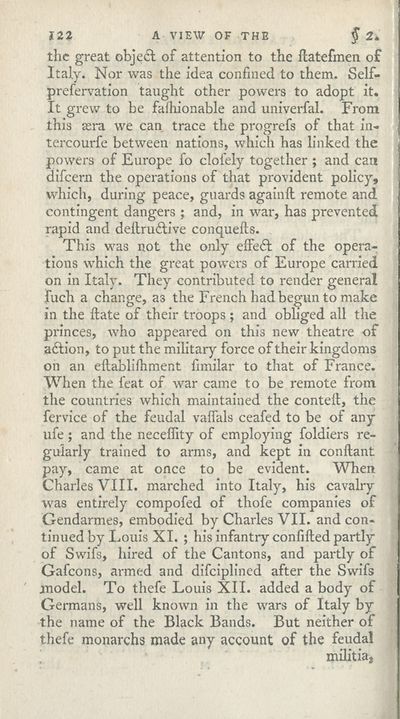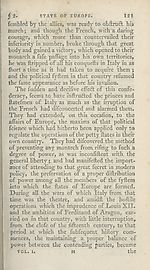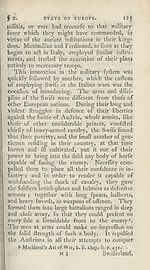Download files
Complete book:
Individual page:
Thumbnail gallery: Grid view | List view

122 A VIEW OF THE § 2.
the great objedt of attention to the ftatefmen of
Italy. Nor was the idea confined to them. Self-
prefervation taught other powers to adopt it.
It grew to be fafhionable and univerfal. From
this tera we can trace the progrefs of that in-
tercourfe between nations, which has linked the
powers of Europe fo clofely together ; and can
difcern the operations of that provident policy,
which, during peace, guards againft remote and
contingent dangers ; and, in war, has prevented
rapid and dellruftive conquefts.
This was not the only effedt of the opera¬
tions which the great powers of Europe carried
on in Italy. They contributed to render general
fuch a change, as the French had begun to make
in the ftate of their troops ; and obliged all the
princes, who appeared on this new theatre of
adtion, to put the military force of their kingdoms
on an eftablifhment funilar to that of France.
When the feat of war came to be remote from
the countries which maintained the contell, the
fervice of the feudal vaffals ceafed to be of any
life ; and the neceflity of employing foldiers re¬
gularly trained to arms, and kept in conftant
pay, came at once to be evident. When
Charles VIII. marched into Italy, his cavalry
was entirely compofed of thofe companies of
Gendarmes, embodied by Charles VII. and con¬
tinued by Louis XI. ; his infantry confided partly
of Swifs, hired of the Cantons, and partly of
Gafcons, armed and difciplined after the Swifs
model. To thefe Louis XII. added a body of
Germans, well known in the wars of Italy by
the name of the Black Bands. But neither of
thefe monarchs made any account of the feudal
militia,
the great objedt of attention to the ftatefmen of
Italy. Nor was the idea confined to them. Self-
prefervation taught other powers to adopt it.
It grew to be fafhionable and univerfal. From
this tera we can trace the progrefs of that in-
tercourfe between nations, which has linked the
powers of Europe fo clofely together ; and can
difcern the operations of that provident policy,
which, during peace, guards againft remote and
contingent dangers ; and, in war, has prevented
rapid and dellruftive conquefts.
This was not the only effedt of the opera¬
tions which the great powers of Europe carried
on in Italy. They contributed to render general
fuch a change, as the French had begun to make
in the ftate of their troops ; and obliged all the
princes, who appeared on this new theatre of
adtion, to put the military force of their kingdoms
on an eftablifhment funilar to that of France.
When the feat of war came to be remote from
the countries which maintained the contell, the
fervice of the feudal vaffals ceafed to be of any
life ; and the neceflity of employing foldiers re¬
gularly trained to arms, and kept in conftant
pay, came at once to be evident. When
Charles VIII. marched into Italy, his cavalry
was entirely compofed of thofe companies of
Gendarmes, embodied by Charles VII. and con¬
tinued by Louis XI. ; his infantry confided partly
of Swifs, hired of the Cantons, and partly of
Gafcons, armed and difciplined after the Swifs
model. To thefe Louis XII. added a body of
Germans, well known in the wars of Italy by
the name of the Black Bands. But neither of
thefe monarchs made any account of the feudal
militia,
Set display mode to:
![]() Universal Viewer |
Universal Viewer | ![]() Mirador |
Large image | Transcription
Mirador |
Large image | Transcription
| Antiquarian books of Scotland > Kings & rulers > History of the reign of the Emperor Charles V. > Volume 1 > (140) |
|---|
| Permanent URL | https://digital.nls.uk/109184011 |
|---|
| Description | By William Robertson. London : Cadell and Davies, 1798. |
|---|---|
| Shelfmark | ABS.1.76.13 |
| Additional NLS resources: | |
| Description | Thousands of printed books from the Antiquarian Books of Scotland collection which dates from 1641 to the 1980s. The collection consists of 14,800 books which were published in Scotland or have a Scottish connection, e.g. through the author, printer or owner. Subjects covered include sport, education, diseases, adventure, occupations, Jacobites, politics and religion. Among the 29 languages represented are English, Gaelic, Italian, French, Russian and Swedish. |
|---|

